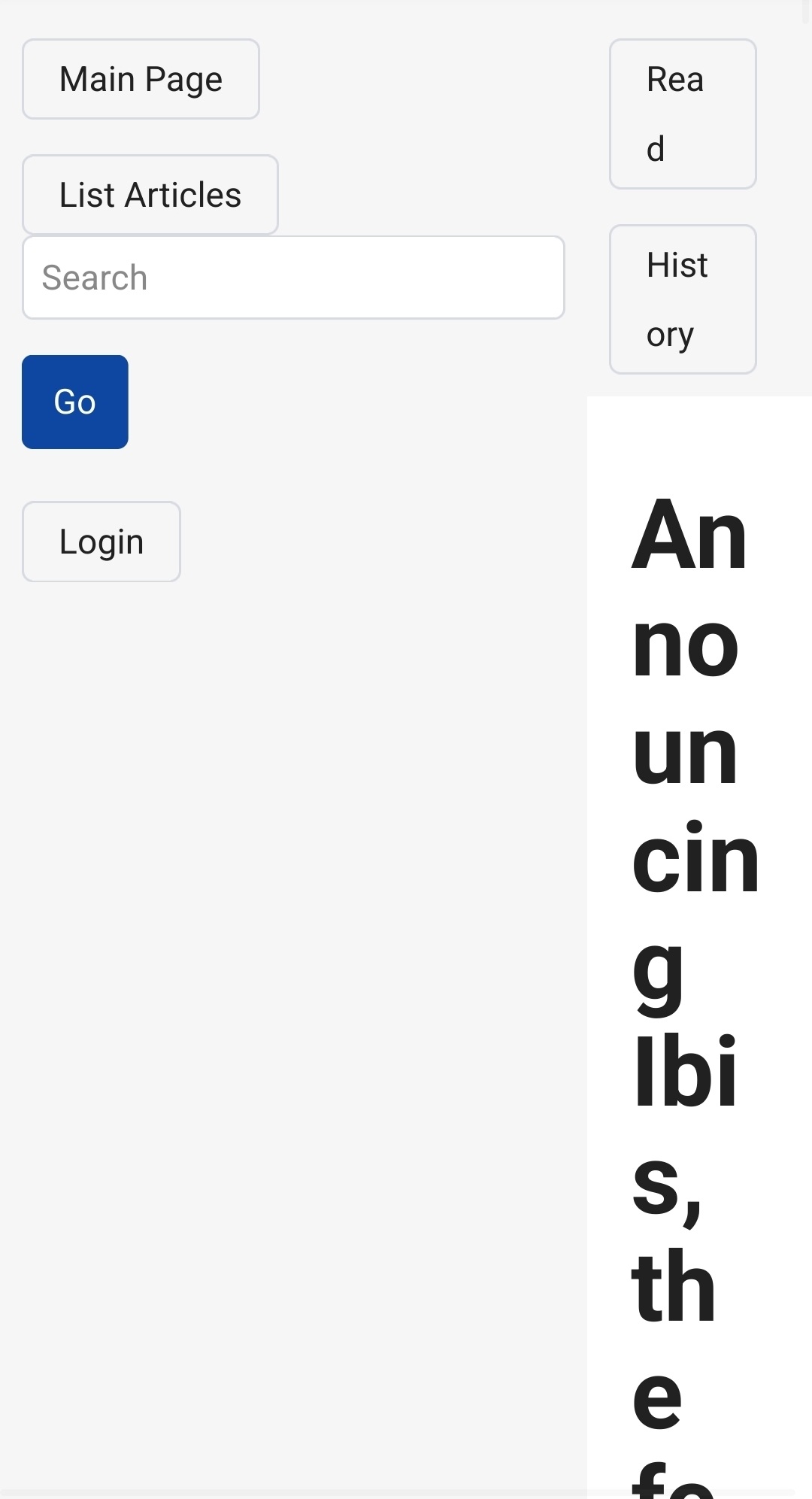deleted by creator
Interesting, maybe it wanted to tell you about this project :D
The UI on mobile is completely broken.

Im not good at frontend development, my goal was to create a very basic frontend which works to show off the project. Going forward I will definitely need help to improve the design or create an entirely new frontend in a different language.
Anyway the main thing about this project is the working federation, but without a basic frontend it would be very difficult to showcase.
I’m learning Leptos too, I’ll watch your progress when lost, good luck !
Maybe you can make some contributions to Ibis ;)
A great idea. I wonder if the fandom wikis could move onto the platform and therefore make the adoption widespread.
I’m going to just say that I’m exteremely sceptical on how this will turn out, just because there has been quite a few Wikipedia forks that have not exactly worked out despite the best interests and the stated objectives they had.
Now - Wikipedia isn’t exactly an entity that doesn’t have glaring problems of its own, of course - but I’m just saying that the wiki model has been tried out a lot of times and screwed up many times in various weird ways.
There’s exactly two ways I can see Wikipedia forks to evolve: Crappily managed fork that is handled by an ideological dumbass that attracts a crowd that makes everything much worse (e.g. Conservapedia, Citizendium), or a fork that gets overrun by junk and forgotten by history, because, well, clearly it’s much more beneficial to contribute to Wikipedia anyway.
I was about to respond with a copy of the standard Usenet spam response form with the “sorry dude I don’t think this is going to work” ticked, but Google is shit and I can’t find a copy of that nonsense anymore, so there.
Its definitely an experiment and I dont know how it will work in practice. But we have this technology, so I wanted to take advantage of it and let people give it a try. At worst Ibis wont be adopted, then I just wasted a few months of time. At best it could turn into a much better Wikipedia, so the upside potential is huge.
btw is this compatible with Markdown or WikiText?
It uses Markdown because it has the best library support.
YAY! Amazing!
But… wikimedia is already self hostable.
Wikimedia isn’t written in Rust, so it’s useless /s
Instead of individual, centralized websites there will be an interconnected network of encyclopedias. This means the same topic can be treated in completely different ways. For example geology.wiki/article/Mountain may be completely different different from poetry.wiki/article/Mountain. There can be Ibis instances strictly focused on a particular topic with a high quality standard, and others covering many areas in layman’s terms.
I don’t think something like this exists yet(?), so it’ll be cool to see how this will be like.
I think this could be useful for a project I have where school that are not connected to the internet could create their own wikis, however, I need to see how it develops.
The idea of a federated, decentralized Wikipedia alternative is intriguing, but implementing it successfully faces major hurdles. Federating moderation policies and privileges across different instances seems incredibly complex. I believe it would also require some kind of web of trust system. Quality control is also a huge challenge without centralized oversight and clear guidelines enforced universally.
While it could potentially replace commercial wiki farms like Wikia/Fandom for niche topics, realistically replacing Wikipedia’s dominance as a general reference work seems highly ambitious and unlikely, at least in the short term. But as they say - shoot for the stars, and you may just land on the moon.
That said, ambitious goals can spur innovation. Even if Ibis falls short of usurping Wikipedia, it could blaze new trails and pioneer federated wiki concepts that feed back into Wikipedia and other platforms. The federated model allowing more perspectives and focused communities is worth exploring, despite the technical obstacles around distributed moderation and content integration. The proof-of-concept shows the core pieces are in place as a starting point.
This is almost entirely misdirected. The success of Wikipedia is from its human structures, the technical structure is close to meaningless. To propose a serious alternative you’d have to approach it from a social direction, how are you going to build a moderation incentive structures that forces your ideal outcomes?
Federation isn’t a magic bullet for moderation, alone it creates fractal moderation problems.
First of all, congratulations for bringing a baby girl into this world!! You must be really excited! I am very happy for you!
This looks very cool. I set up a wiki (https://ibis.mander.xyz/) and I will make an effort to populate it with some Lemmy lore and interesting science/tech 😄 Hopefully I can set some time aside and help with a tiny bit of code too.
Thank you :)
What could possibly go wrong!
Adding reference to HN submission of this article. Discussion thus far has 233 comments.
It is not well known but there have been numerous scandals which put this trust into question. For example in 2012, a trustee of the Wikimedia Foundation UK used his position to place his PR client on Wikipedia’s front page 17 times within a month. Wikipedia founder Jimmy Wales made extensive edits to the article about himself, removing mentions of co-founder Larry Sanger. In 2007, a prolific editor who claimed to be a graduate professor and was recruited by Wikipedia staff to the Arbitration Committee was revealed to be a 24-year-old college dropout. These are only a few examples, journalist Helen Buyniski has collected much more information about the the rot in Wikipedia.
I don’t really understand how decentralization would address the trust and legitimacy problems of Wikipedia. I do see value in adding community wikis to Lemmy, however.
Wikipedia got as bad as it did because neoliberals had gotten into positions of power and kicked everyone else out. They weren’t the people who made the site (it was one guy who did like 90% of the articles) but they are the ones who made it the shithole that it is today.
This is a great project. I had the same idea myself, and posted about it, but never did anything about it! It’s great that people like you are here, with the creativity, and the motivation and skills to do this work.
I think this project is as necessary as Wikipedia itself.
The criticisms in these comments are mostly identical to the opinion most people had about Wikipedia when it started - the it would become a cesspool of nonsense and misinformation. It was useless and worthless when encyclopaedias already exist.
Wikipedia was the first step in broadening what a source if authoritative information can be. It in fact created richer and more truthful information than was possible before, and enlightened the world. Ibis is a necessary second step on the same path.
It will be most valuable for articles like Tienneman square, or the Gillet Jaunes, where there are sharply different perspectives on the same matter, and there will never be agreement. A single monolithic Wikipedia cannot speak about them. Today, wiki gives one perspective and calls it the truth. This was fine in the 20th century when most people believed in simple truths. They were told what to think by single sources. They never left their filter bubbles. It’s not sustainable.
To succeed and change the works, this project must do a few things right
-
The default instance should just be a mirror of Wikipedia. This is the default source of information on everything, so it would be crazy to omit it. Omitting it means putting yourself in competition with it, and you will lose. By encompassing it, the information in Ibis is from day 1 greater then wiki. Ibis will just supersede wiki.
-
There should be a sidebar with links to the sane article on other instances. So someone reading about trickle down economics on right wing instance, he can instantly switch to the same article on a left wing wiki and read the other side of it. That’s the feature that will make it worthwhile for people.
-
It should look like Wikipedia. For familiarity. This will help people transition.
Thanks for the support. I think the era of single, centralized sources of information will soon be in the past.
- This would be a project on its own, with writing import scripts, hosting an instance etc. Certainly not something I have time for, just like I’m not running a Reddit mirror for Lemmy. If you or someone else wants to set it up, go ahead!
- How would you detect that it’s the same article, only from having the identical title? That could fail in lots of ways.
- I agree about this.
-
I just assumed that would be easy, that you would have one instance with no actual content. It just fetches the wikipedia article with the same name, directly from the wikipedia website. I guess I didn’t really think about it.
-
I guess that’s a design choice. Looking at different ways similar issues have been solved already…
How does wikipedia decide that the same article is available in different languages? I guess there is a database of links which has to be maintained.
Alternatively, it could assume that articles are the same if they have the same name, like in your example where “Mountain” can have an article on a poetry instance and on a geography instance, but the software treats them as the same article.
Wikipedia can understand that “Rep of Ireland” = “Republic of Ireland”. So I guess there is a look-up-table saying that these two names refer to the same thing.
Then, wikipedia can also understand cases where articles can have the same name but be unrelated. Like RIC (paramilitary group) is not the same as RIC (feature of a democracy).
I do think, if each Ibis instance is isolated, it won’t be much different from having many separate wiki websites. When the software automatically links you to the same information on different instances, that’s when the idea becomes really interesting and valuable.
-
-
I don’t think a federated wiki is solving any of the problems of wikipedia. You’ve just made a wiki that is more easily spammed and will have very few contributors. Yes, Wikipedia is centralized, but it’s a good thing. No one has to chase down the just perfect wikipedia site to find general information, just the one. The negative of wikipedia is more its sometimes questionable moderation and how its english-centric. This has more to do with fundamentally unequal internet infrastructure in most countries than anything though. Imperialism holds back tech.
I agree that it might be fine for niche wikis but again, why in the world would you ever want your niche wiki federated? Sounds like a tech solution looking for the wrong problem.
I think it solves the problems of Fandom, but yeah Wikipedia is good










